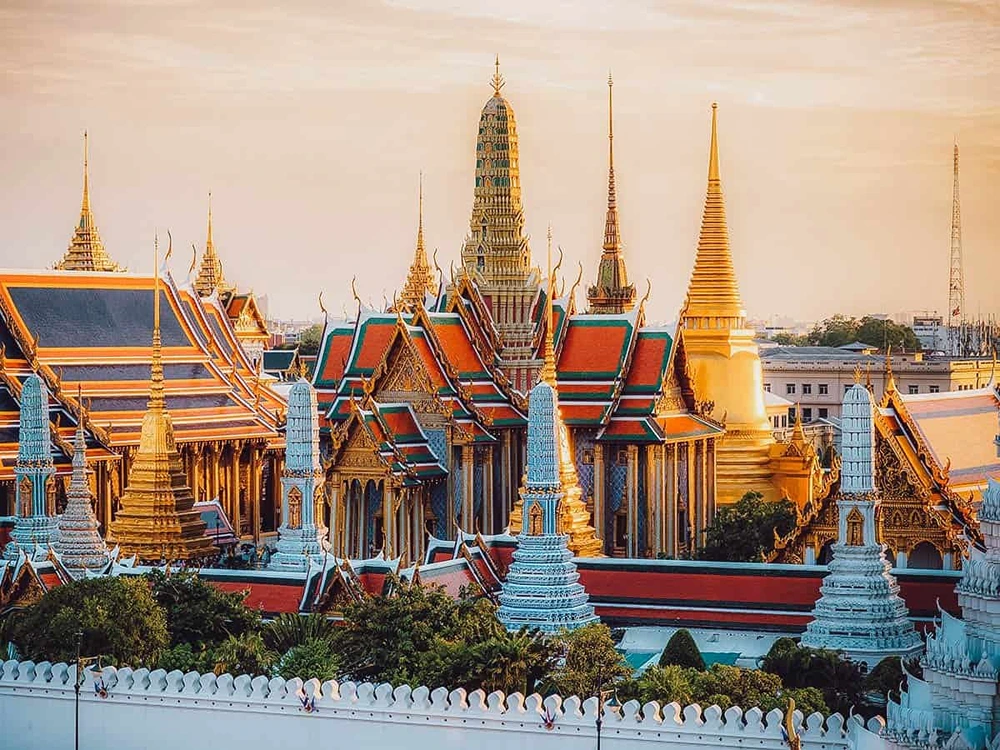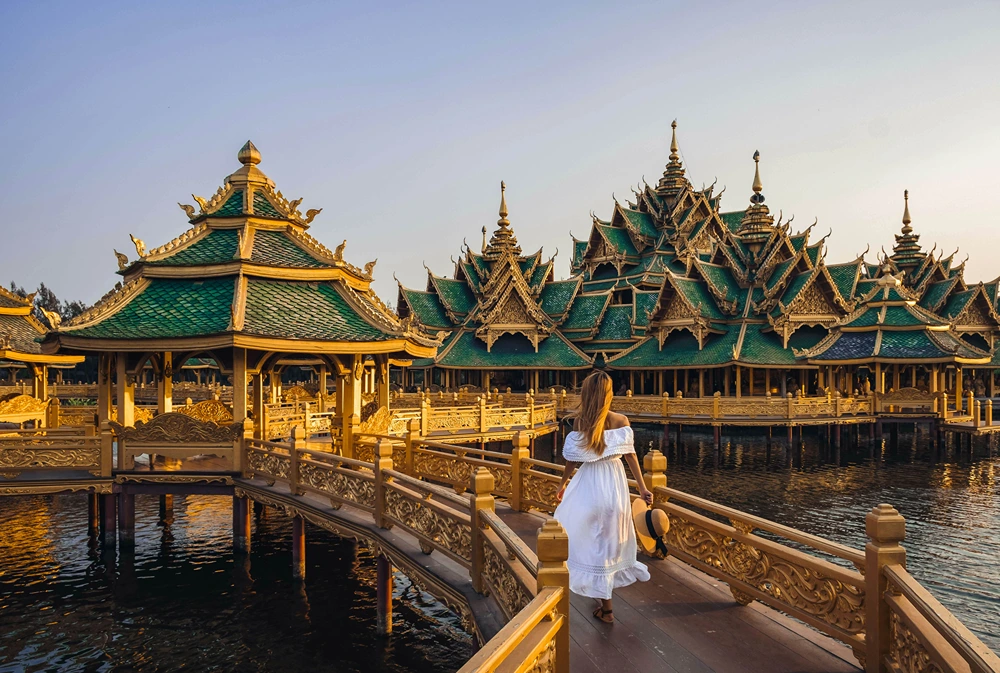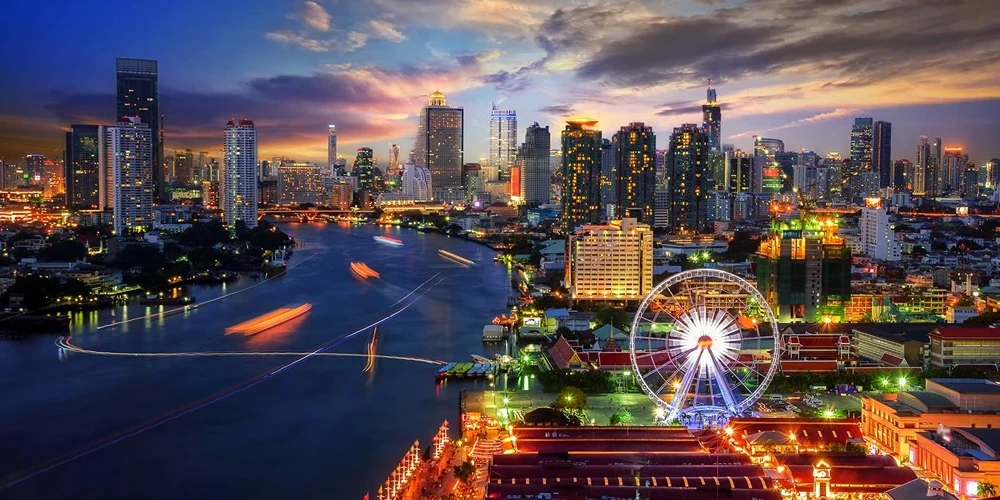Key highlights of Bangkok include:
- Stunning temples and palaces showcasing intricate Thai architecture
- Vibrant street markets offering everything from fresh produce to handicrafts
- World-class shopping malls and entertainment complexes
- Diverse culinary scene featuring both street food and fine dining
- Exciting nightlife with options for all preferences
Travel Resources
- Cheapest Flights to Bangkok: Find the best deals on flights to Bangkok with our flight search tool. Start planning your trip to this exciting destination.
- Insure Your Trip: Ensure a worry-free vacation with travel insurance tailored to your needs.
- Rent a Car in Bangkok: Explore Bangkok and its surrounding areas at your own pace by renting a car. Book online for convenience and flexibility.
- Book Your Tours: Discover Bangkok’s top attractions and experiences with our curated tours.

Some History First
Bangkok’s history is as rich and diverse as the city itself. Here’s a brief overview:
- Ancient origins: The area was originally a small trading post during the Ayutthaya Kingdom (14th-18th centuries).
- Birth of modern Bangkok: In 1782, King Rama I established Bangkok as the new capital after the fall of Ayutthaya.
- Rapid development: The 19th and 20th centuries saw Bangkok transform from a traditional Asian city to a modern metropolis.
- Recent history: Bangkok has weathered political changes and natural disasters while continuing to grow as a global city.
Key historical sites include:
- Grand Palace: Built in 1782, it served as the royal residence until 1925.
- Wat Pho: One of the oldest and largest temples in Bangkok, known for its reclining Buddha.
- Wat Arun: The iconic Temple of Dawn, featuring a distinctive central prang (Khmer-style tower).
Bangkok Today
Modern Bangkok is a dynamic cityscape blending tradition with innovation:
- Population: Over 10 million in the greater Bangkok area
- Economy: A major economic center in Southeast Asia
- Culture: A melting pot of Thai, Chinese, Indian, and Western influences
- Technology: Embracing smart city initiatives and digital innovation
Notable aspects of contemporary Bangkok:
- Skyscrapers dotting the skyline alongside ancient temples
- Modern public transportation systems like the BTS Skytrain and MRT
- Thriving startup ecosystem and co-working spaces
- Green spaces like Lumphini Park providing respite from urban bustle
Is Bangkok Safe?
Bangkok is generally safe for tourists, but as with any large city, it’s important to exercise caution:
- Petty crime: Be aware of pickpocketing in crowded areas and tourist hotspots.
- Scams: Be cautious of tuk-tuk drivers offering suspiciously cheap rides or strangers being overly friendly.
- Traffic: Exercise caution when crossing streets, as traffic can be chaotic.
- Political demonstrations: Occasionally occur but are usually peaceful. Avoid large gatherings.
Safety tips:
- Keep valuables secure and be aware of your surroundings
- Use reputable transportation services
- Drink bottled water and be cautious with street food hygiene
- Respect local customs and dress modestly when visiting temples
Where is Bangkok?
Bangkok is strategically located in central Thailand:
- Coordinates: 13.7563° N, 100.5018° E
- Region: Central Plains of Thailand
- River: Situated along the Chao Phraya River
- Elevation: Mostly flat, with an average elevation of 1.5 meters (4.9 ft) above sea level
Neighboring provinces include:
- Nonthaburi
- Pathum Thani
- Samut Prakan
- Samut Sakhon
- Nakhon Pathom
Latest Articles
From The Area
Nothing found.
What is the Best Time to Visit Bangkok?
- November to February (Cool Season): The most popular time to visit
- Comfortable temperatures (average 26-28°C / 79-82°F)
- Low humidity and minimal rainfall
- Ideal for sightseeing and outdoor activities
- March to May (Hot Season):
- Very hot and humid (average 30-35°C / 86-95°F)
- Good for water festivals like Songkran in April
- Less crowded and potentially lower prices
- June to October (Rainy Season):
- Frequent short, heavy showers
- Lower temperatures but high humidity
- Lush green landscapes and fewer tourists
Tip: Regardless of the season, always carry an umbrella or light raincoat, as sudden showers can occur.
How to Get to Bangkok & Around
- By Air:
- Suvarnabhumi Airport (BKK): The main international gateway
- Don Mueang International Airport (DMK): Serves many low-cost carriers
- By Train: Long-distance trains connect Bangkok to other major Thai cities and Malaysia
- By Bus: Extensive bus network connecting Bangkok to other parts of Thailand
Getting Around Bangkok:
- BTS Skytrain: Elevated rail system covering most central areas
- MRT: Underground metro system complementing the BTS
- Buses: Extensive network covering the entire city
- Taxis: Abundant and relatively cheap, but insist on using the meter
- Tuk-tuks: Iconic three-wheeled vehicles, good for short trips
- River boats: A scenic way to avoid traffic on the Chao Phraya River
- Motorcycle taxis: Quick but not for the faint-hearted
- Grab: Popular ride-hailing app in Southeast Asia
Tip: Consider purchasing a Rabbit Card for convenient use on BTS, MRT, and some buses.
Things to Do in Bangkok
Explore Bangkok’s top attractions and activities, Bangkok offers a wealth of attractions and activities for all types of travelers:
Cultural Attractions:
- Grand Palace and Wat Phra Kaew: Thailand’s most sacred temple complex
- Wat Pho: Home to the famous reclining Buddha
- Wat Arun: Iconic temple on the west bank of the Chao Phraya River
- Jim Thompson House: Traditional Thai architecture and art collection
Markets and Shopping:
- Chatuchak Weekend Market: One of the world’s largest outdoor markets
- Floating Markets: Damnoen Saduak or Amphawa for a unique shopping experience
- Siam Paragon and CentralWorld: Modern shopping malls for luxury brands
Neighborhoods to Explore:
- Chinatown: Bustling streets, gold shops, and excellent street food
- Khao San Road: Backpacker haven with lively nightlife
- Sukhumvit: Modern district with upscale dining and nightlife options
Other Activities:
- Take a cooking class to learn Thai cuisine
- Enjoy a Thai massage at a traditional spa
- Cruise the Chao Phraya River at sunset
- Visit the Bangkok Art and Culture Centre for contemporary art
Where To Stay In Bangkok
Bangkok offers accommodation options for every budget and preference:
Luxury:
- Riverside: Mandarin Oriental, The Peninsula
- Sukhumvit: The Okura Prestige, Sofitel Bangkok Sukhumvit
Mid-range:
- Silom: Pullman Bangkok Hotel G, Amara Bangkok
- Siam: Siam Kempinski, Centara Grand at CentralWorld
Budget:
- Khao San Road area: Rambuttri Village Inn, Nouvo City Hotel
- Sukhumvit: Citypoint Hotel, S Box Sukhumvit Hotel
Tips for choosing accommodation:
- Consider proximity to BTS/MRT stations for easy transportation
- Book in advance during peak seasons (November-February)
- Look for hotels with pool access to cool off after a day of sightseeing

What To Eat In Bangkok
Bangkok is a food lover’s paradise, offering everything from street food to fine dining:
Must-try dishes:
- Pad Thai: Stir-fried rice noodles with shrimp, tofu, or chicken
- Tom Yum Goong: Spicy and sour shrimp soup
- Som Tam: Spicy green papaya salad
- Mango Sticky Rice: Sweet dessert of ripe mango with coconut sticky rice
- Kai Med Ma Muang: Stir-fried chicken with cashew nuts
Where to eat:
- Street Food: Try Yaowarat (Chinatown) or Ratchawat Market
- Food Courts: MBK Center or Terminal 21 for variety in air-conditioned comfort
- Fine Dining: Gaggan Anand or Bo.lan for innovative Thai cuisine
Food safety tips:
- Choose busy stalls with high turnover
- Ensure meat is thoroughly cooked
- Drink bottled water and avoid ice in drinks from street vendors
Entry & Exit Requirements
Visa requirements for entering Thailand vary depending on your nationality:
- Many nationalities can enter visa-free for 30 days
- Some may need to obtain a visa on arrival
- For longer stays, apply for a tourist visa at a Thai embassy before travel
Important documents:
- Passport valid for at least 6 months beyond your planned stay
- Proof of onward travel
- Proof of sufficient funds (20,000 baht per person or 40,000 baht per family)
Departure:
- Departure tax is typically included in your airline ticket
- Keep your departure card (given upon arrival) for presentation at exit
Always check the latest requirements with the Thai embassy or consulate in your country before travel.
What To Pack For Your Trip
When packing for Bangkok, consider the tropical climate and cultural norms:
Essentials:
- Lightweight, breathable clothing
- Comfortable walking shoes
- Modest attire for temple visits (covered shoulders and knees)
- Rain jacket or umbrella
- Sunscreen and insect repellent
- Reusable water bottle
- Power adapter (Thailand uses 220V, 50Hz with Type A, B, and C plugs)
Additional items:
- Hand sanitizer and wet wipes
- Medication and a basic first-aid kit
- Photocopies of important documents
- Cash and credit cards (inform your bank of your travel plans)
Tip: Leave room in your luggage for souvenirs and local purchases!
Remember to respect local customs and dress codes, especially when visiting religious sites or rural areas. With proper preparation, your trip to Bangkok will be comfortable, safe, and memorable.
FAQs
Bangkok is generally safe, but be cautious of scams and pickpocketing in crowded areas.
The currency in Thailand is the Thai Baht (THB). ATMs are widely available throughout the city.
Don’t miss Wat Arun (Temple of Dawn), Wat Pho (Temple of the Reclining Buddha), and Wat Saket (Golden Mount).


